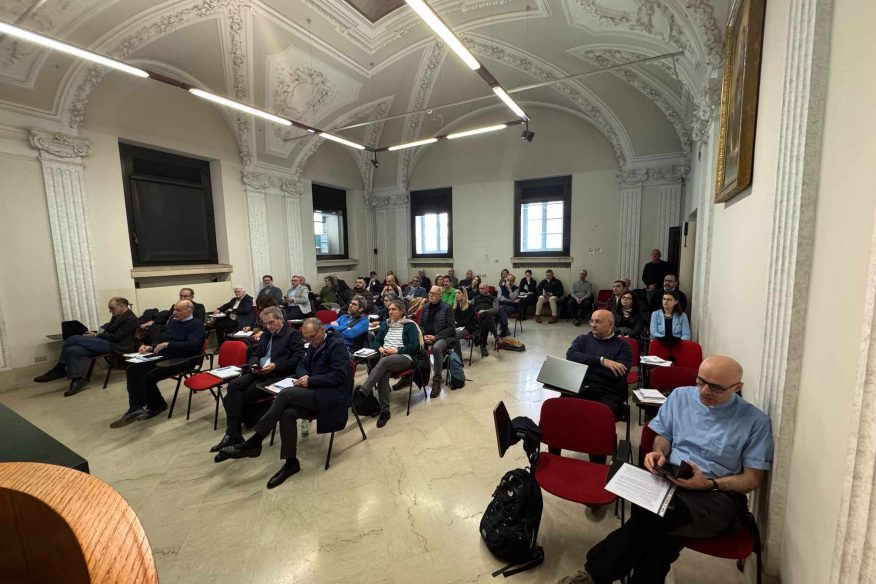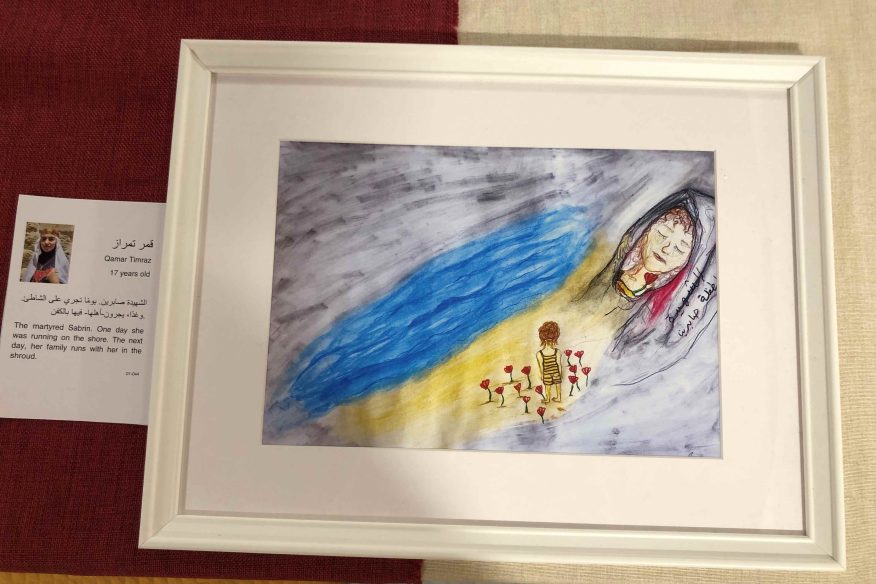The Four Meetings of Treasurers: Balancing Budgets and Looking Ahead
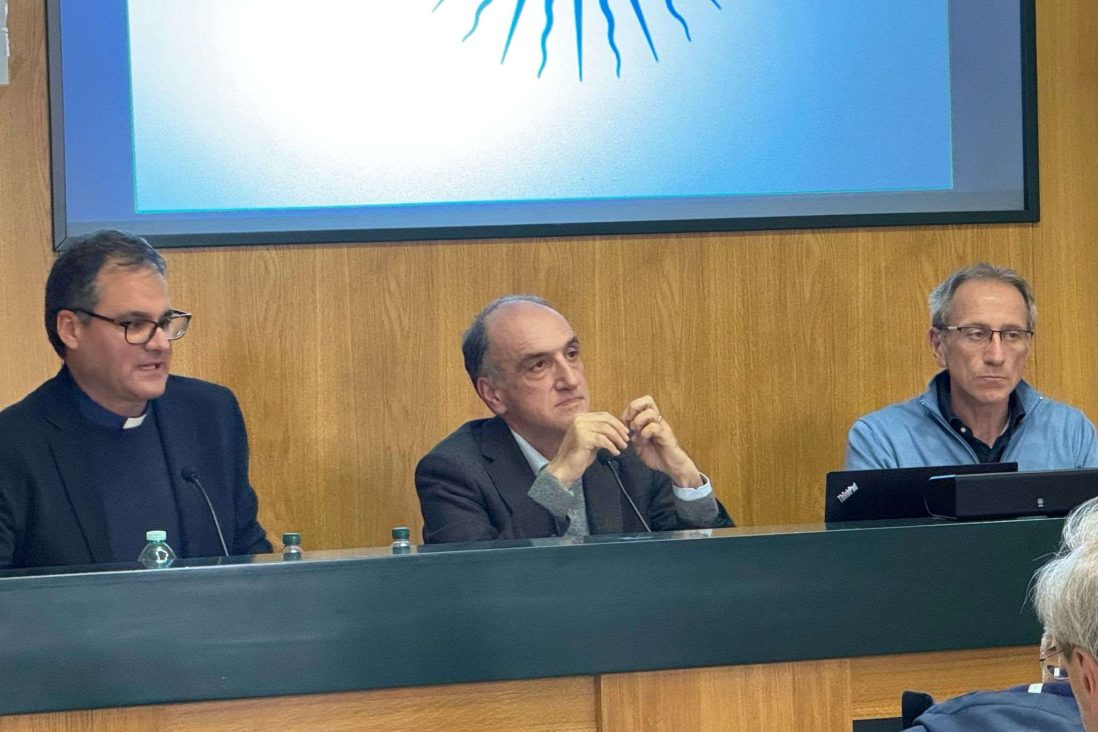
The annual meeting of administrators of the communities and works of the EUM Province has now become a tradition, held for over a decade. This year, it took place in four locations — Milan (April 2), Rome (April 9), Palermo (April 29), and Malta (May 6) — with three main objectives:
to offer those involved in administration an opportunity to meet or reconnect with others working in the same field within the Province.
to provide an overview of the fundamental choices, key areas of work, and some specific projects of the Provincial Treasurer’s Office.
to present reflections and updates on specific issues related to the administration of goods.
The Economy of Francesco
This year, particular attention was given to the fourth Universal Apostolic Preference (UAP): Caring for Our Common Home, in collaboration with the Province’s Eco-Team.
In his talk, Fr. Mauro Bossi, editor of Aggiornamenti Sociali and, since 2023, delegate for ecology for the Euro-Mediterranean Province, reflected once again on how the Society of Jesus is committed to responding to the call to collaborate, with evangelical depth, in the protection and renewal of God’s creation.
Fr. Davide Dell’Oro offered a very practical reflection on the topic of decarbonization, including some guidelines already applicable in the management of properties within the Province.
During the meetings the results of the EUM Province’s final budget for 2024 were also presented. Additionally, two short information sessions were offered: one on recent developments in the Reform of the Third Sector, and another on catastrophic event insurance, which is supplementary to mandatory policies. In total, around 180 participants — including treasurers, ministers, and administrators — took part in the meetings.
The Economy of Francesco
In his address, the director of the Provincial Treasurer’s Office, Berardino Guarino, revisited Pope Francis’s teachings on the economy, which are powerfully summarized in the manifesto of the “The Economy of Francesco” community — a group made up of economists, entrepreneurs, and changemakers. Directly promoted by the Pope, this community has grown over time, produced texts and reflections, and, above all, has circulated experiences and best practices. Guarino highlighted the twelve points of the Assisi Pact, signed in 2022 by members of the community, a text that, over the years, has served as “the compass of this international movement that has taken up the Pope’s challenge: to work so that the economy of today and tomorrow becomes a Gospel-inspired economy, an economy of peace, not war; an economy that opposes the proliferation of weapons, especially the most destructive; an economy that cares for creation and does not exploit it; an economy that serves the person, the family, and life, one that respects every woman, man, child, elder, and above all the most fragile and vulnerable; an economy where care replaces waste and indifference; an economy that leaves no one behind, to build a society where the stones rejected by the dominant mindset become cornerstones; an economy that recognizes and protects dignity and secure work for all, especially for women; an economy where finance is a friend and ally of the real economy and of labour, not its enemy; an economy that values and preserves the cultures and traditions of peoples, all living species, and the Earth’s natural resources; an economy that fights poverty in all its forms, reduces inequalities, and dares to say, with Jesus and with Francis, ‘blessed are the poor’; an economy guided by personal ethics and open to transcendence; an economy that creates wealth for all, that generates joy and not just well-being because happiness that is not shared is not enough.” Guarino also referred to Pope Francis’s speech on September 23, 2024, delivered during the launch of the “The Economy of Francesco” Foundation, in which the Pope emphasized three attitudes required of those working in this field: to be witnesses, not to be afraid, and to hope tirelessly.
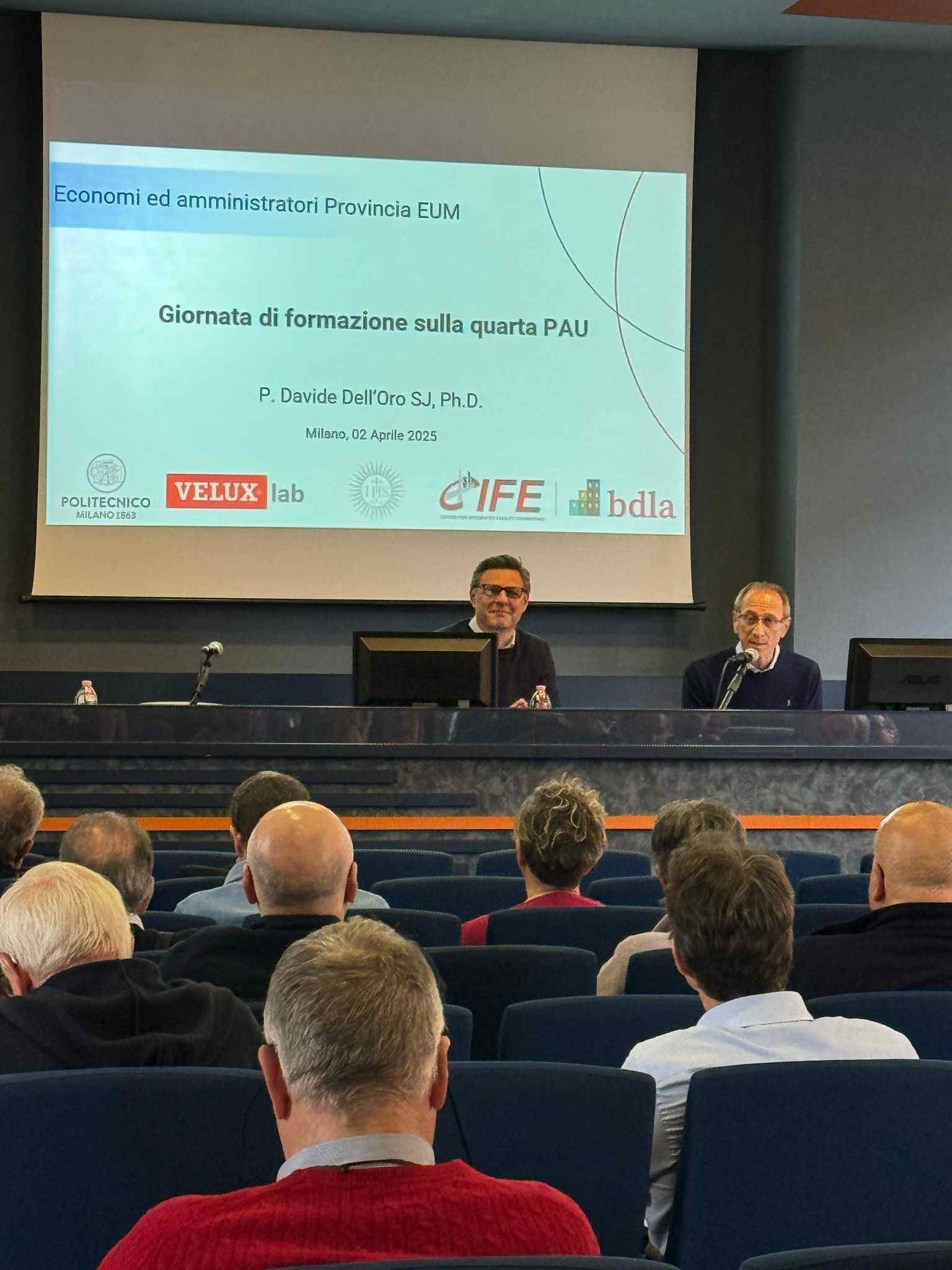
“Universities, businesses, various organizations and movements, our Works, our Schools, and our Communities are workshops of hope, places for building new ways of understanding the economy and progress, for combating the culture of waste, for giving a voice to the voiceless, and for proposing new lifestyles. They are also places where concrete signs can be made, signs that carry both prophetic and tangible value. For example, transforming certain properties for social purposes, or creating and supporting social enterprises that can generate employment without profit motives, serving the common good. Above all, these are spaces where the work of forming consciences never ceases because when people are filled with a desire for change, the journey is already well underway.”
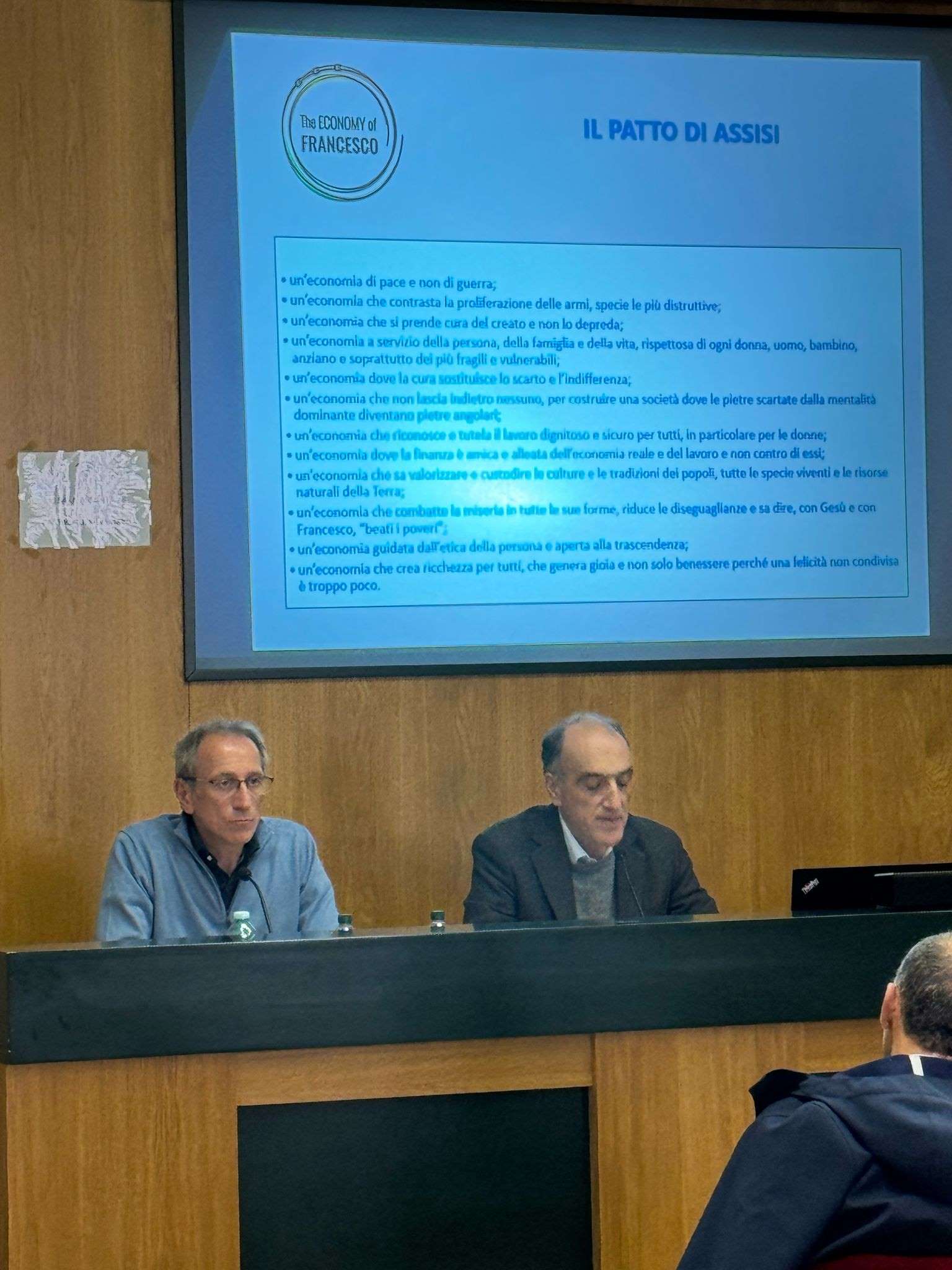
Establishing True Priorities
Guarino then emphasized the centrality of the Universal Apostolic Preferences (UAPs), recalling what Father General has stated over the past few years, while highlighting a particular insight: “If we don’t plan, if we insist on doing everything without establishing real priorities or if we set so many priorities that, in the end, there are no true priorities we will end up burned out or frustrated. We cannot ignore the enormous difficulty we face in making decisions, in taking clear directions, especially when it comes to apostolates with a long-standing tradition over time or within the province. But we must always remember that Ignatius passed on a charism and a lived experience that urge us to make choices, to decide by aiming for the Magis, for the greater service, for the greater good.”
From the broader context, the discussion then moved to some information about the budget, which, for the eighth consecutive year, is a single consolidated EUM budget, grouping and representing the assets of the former Provinces of Italy and Malta, as well as the former Region of Romania. It confirms a positive trend, remaining in surplus. “All our Works, even in 2024, have shown, through their activities and also through their financial results, resilience, flexibility, and a capacity for change. Challenging situations are not lacking, nor are concerns or concrete worries regarding sustainability. Nevertheless, the results we are achieving, both as a Province and in our Works, should encourage us to maintain firm determination in facing the challenges and questions that our daily responsibilities as treasurers, ministers, and administrators bring.”
Financial Assets and Ethical Investments
In his report, Guarino gave particular attention to the relationship between financial assets and ethical investments. “The Apostolic Preference of Caring for Our Common Home includes, among other things, the challenge of promoting a more ecological use of financial resources. Even the Apostolic Plan of the EUM Province, at the time of its launch in 2017, already set a mid-term goal: to have the entire investment portfolio certified as ethical.” The Province has held this certification for several years now, obtained through collaboration with Nummus, a firm promoted by the Italian Bishops’ Conference (CEI). Nummus reviews all financial products and companies in which investments are made, on a monthly basis, using a set of criteria that includes environmental sustainability, transparent governance, protection of workers’ and consumers’ rights, and, based on CEI guidelines, alignment with Catholic values in matters such as the protection of life, non-investment in weapons and coal, ecc.. The rating is updated regularly, and each month any non-compliant investments that is, securities or products acquired by managers that fall outside the ethical parameters are reported.
International Campaigns
Always with the goal of promoting a more ethical use of financial resources, the EUM Province participates in several campaigns, such as the one promoted internationally by the Laudato Si’ Movement on divesting from fossil fuels. Recently, a new organisation was established—the Italian Interreligious Centre for Dialogue—which brings together religious and lay organizations aiming to raise awareness among major companies on issues of environmental protection and the common good, especially when those companies appear guided by values and goals far from ours. In a relatively short time, a good number of such dialogues have already taken place. For a few months now, the organisation has also been promoting the campaign for the abolition of nuclear weapons, which the EUM Province has also joined.
Finally, the Province is continuing its collaboration with the Italian Episcopal Conference in anticipation of the release of the 2.0 Guidelines on ethical investments, which are expected to be issued soon.
